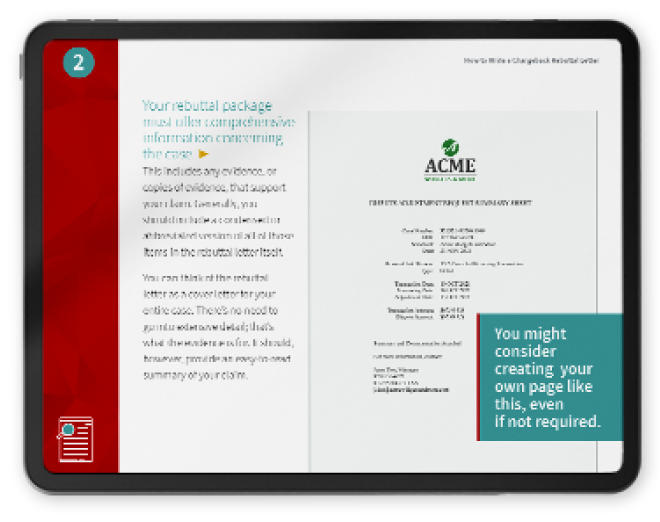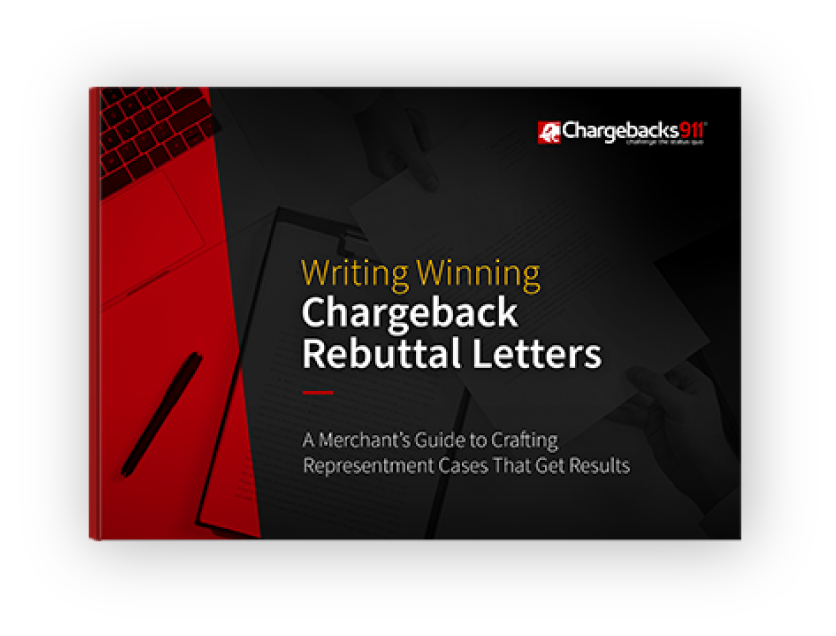When a Customer Disputes a Charge, What are Your Rights as a Merchant?
In a perfect world, consumers and merchants would coexist in harmony. You’d offer products and services, and customers would purchase them. Consumers would get what they need, and you make a profit.
It’s a great arrangement… at least in theory.
The problem is that disputes between merchants and consumers happen all the time. Most can be resolved between the two parties. In worst-case scenarios, though, additional safety measures may be needed. Cardholders need codified rights to protect their interests when disputes occur. But then again, so do merchants like you.
What are your credit card merchant chargeback rights? Why are they important? And how can they help you protect your business against chargeback abuse? In this article, we’ll answer those questions, and offer tips to help you make the most of your rights.
Recommended reading
- Chargeback Laws: What's the Legal Basis for Card Disputes?
- American Express Chargeback Time Limits: The 2025 Guide
- Chargeback Time Limits: the Merchant's Guide for 2025
- Is Chargeback Fraud Illegal? Here’s the Simple Truth.
- What is the The Fair Credit Billing Act?
- Explaining Section 75 of the Consumer Credit Act
9 Essential Merchant Chargeback Rights You Need to Know
Each card scheme has its own regulations. So, a merchant's specific credit and debit card chargeback rights often vary. This is further complicated because the rights for each incident are based on the reason code.
We can still make some general statements about merchant chargeback rights and liabilities, though. As a merchant, you have these rights in every chargeback case:
1. | The Right to the Original Price
The chargeback (or multiple partial amount chargebacks added together) cannot exceed the original transaction amount. The issuer can only file a chargeback for:
- The total original transaction amount
- A portion of the original transaction amount
The chargeback can include shipping or handling fees for an item not received and any surcharges applied to the disputed transaction. However, the bank can’t increase the price of the transaction by adding undelineated fees or penalties. All costs associated with the original purchase must be tallied in with the chargeback total.
Learn more about chargeback fees
2. | The Right to Zero Cash-Back Disputes
If a cardholder gets cash back as part of a transaction, they’re not allowed to file a chargeback for the cash-back portion. This also means a cardholder can’t file a chargeback for a cash withdrawal or an item they had already returned for cash.
For example, let’s say a cardholder purchases a lamp from your store and receives $20 cash back with the transaction. They can file a chargeback on the purchase, but not on the $20.
3. | The Right to Late Delivery Exemption
A purchased item arrives after the agreed-upon delivery date. If you can prove you didn’t abuse any shipping policies, then the cardholder has to prove they attempted to return the item before they can file a chargeback.
In other words, being impatient for an order to be delivered doesn’t mean the customer has the right to a chargeback. They have a responsibility to work things out with you first, and it’s the issuer’s job to make sure that happens before they allow a chargeback.
4. | Attempt to Resolve Before Chargeback
Going off that last point — a lot of reason codes explicitly require the cardholder to contact you and try to resolve the issue before filing a chargeback. Again, the issuer is obligated to enforce the mandate.
Even without a specific mandate, customers should always try to resolve problems with you first; filing a chargeback should only be a last resort. If an issuer ignores this step and skips directly to a chargeback, they’re infringing on your chargeback rights.
5. | The Right to Reason Codes
When a bank files a chargeback, they attach a chargeback reason code. This is a 2- to 4-digit alphanumeric code meant to identify the reason for the dispute.
Reason codes can be deceptive. In friendly fraud cases, for example, a false reason code may be used as a cover for the cardholder’s actions. Even so, the reason code points to the official reason for the dispute, which impacts how you should respond. That’s why you have the right to know the reason code attached to each chargeback.
6. | The Right to 15 Days
What if a cardholder sends merchandise back as part of a return, but you never return their money? The cardholder can file a chargeback, but the issuer must wait 15 calendar days from when the return was made to process the claim.
This right is most relevant to partial chargebacks or returns that you haven’t fully processed. The rule gives you a chance to issue a complete refund before the chargeback is officially filed. It also helps reduce the risk of so-called “double refund” chargebacks.
One important exception to the 15-day rule is any case where waiting 15 days will exceed the chargeback filing deadline. If the chargeback filing deadline is less than 15 days away, the issuer may bypass this merchant chargeback right.
7. | The Right of Product Returns
When items are not returned, it is generally because the cardholder has denied that they received the items. If that is true, then the cardholder would be justified in their refund request. If they did receive the item and are claiming they haven’t, then this is a case of friendly fraud.
You have a right to have the merchandise in question returned to them in the event of a chargeback. You can also send a demand letter and insist customers return the products received if the returned goods are not forthcoming.
If you have proof that the items in dispute were delivered to the buyer, and that you’ve transparently communicated that fact to the cardholder, then you’re entitled to fight back.
8. | The Right to Representment
The most important of all the guaranteed merchant credit card chargeback rights is the right to fight back against illegitimate chargebacks. In fact, you could even think of this as more than a right; it could be considered a responsibility.
Engaging in representment discourages cardholders from abusing the chargeback process. If it's faster, easier, and more effective to ask for a refund, fewer customers will default to a chargeback. It also sends a powerful message to banks, incentivizing them to engage in more due diligence, which makes the system fairer for everyone:
9. | The Right to Arbitration
As we often warn merchants, mistakes made during representment can come back to haunt you. If you leave out any pertinent details that the bank requires, your claim will be summarily rejected. You could be inviting a secondary chargeback, or pre-arbitration chargeback.
Once the matter has reached this stage, the merchant has a choice to make: either accept the chargeback, or proceed to arbitration. If they choose to go to that final step, then the card network will step in and make a final, impartial decision. This takes the question out of the issuer’s hands.
Remember, though: arbitration comes with hefty fees and penalties for the party ultimately found responsible. Merchants should never enter into this process lightly.
Merchants Must Stand up for Their Rights
We think merchants should always be prepared to fight back against chargebacks. After all, if you have proof that a chargeback is illegitimate, you're simply throwing money away if you don’t contest it.
In such cases, we urge you to dispute the transaction with your merchant account provider. Remember: every invalid chargeback you ignore will increase your chargeback ratio and negatively impact your bottom line.
Unfortunately, the burden of proof rests on your shoulders. You have to keep meticulous records of every transaction, and focus heavily on customer service and satisfaction. And, if you intend to challenge a chargeback, you will need to provide evidence including:
- Copies of the sales receipt and/or order forms
- Tracking numbers and proof of delivery
- A copy of your return policy, with evidence it is easily accessible on your site
- Descriptions and screenshots of items as they appear on your site
- Any communications indicating successful delivery or customer satisfaction
Chargebacks do not have to be a cost of doing business. By maintaining an excellent dialogue with banks and cardholders, and keeping track of all incoming and outgoing communications, you’re already a few steps ahead in your representment game. To take these precautions to the next level, instituting a comprehensive chargeback management strategy is your best bet.
Ask the Experts
If you’re one of the merchants who assumes chargebacks are just a part of life, it is time to stand up for your merchant chargeback rights. Fight back!
Chargebacks911® fights chargebacks on your behalf, offering the industry's only performance-based ROI guarantee. Contact us today to see how you could recoup more profits and send a valuable message to the credit card industry at the same time.
FAQs
What are the rules for a chargeback?
Chargeback rules are complex, and vary from one card brand to the next. In most cases, though, the cardholder has 120 days to dispute charges resulting from fraud or merchant error. The merchant then has the right to respond to the claim if they believe it is invalid.
Can a bank refuse to do a chargeback?
Yes. If the issuing bank investigates the cardholder’s claim and finds the case without merit, they can reject the dispute with no penalty to the merchant.
What are the conditions for chargeback?
A chargeback should only be filed if a) the consumer has a legitimate complaint about an order, such as fraud; b) the cardholder has made reasonable but unsuccessful attempts to contact the merchant and resolve the issue.
What is a valid reason for a chargeback?
Valid reasons for filing chargebacks include merchant billing errors, defective or missing goods, or fraudulent or unauthorized activity, to name just a few.
Who decides who wins a chargeback?
The cardholder's issuing bank is responsible for determining the winning party in a first-cycle chargeback.
How do you fight a chargeback dispute?
If a merchant believes a chargeback claim is invalid, they can challenge the chargeback through the representment process. The basic steps involve collecting the transaction details and any compelling evidence to make your case, then creating and submitting a rebuttal letter by the card network’s deadline
For a more complete look at representment rebuttals download our free Writing Winning Chargeback Rebuttal Letters guide.















